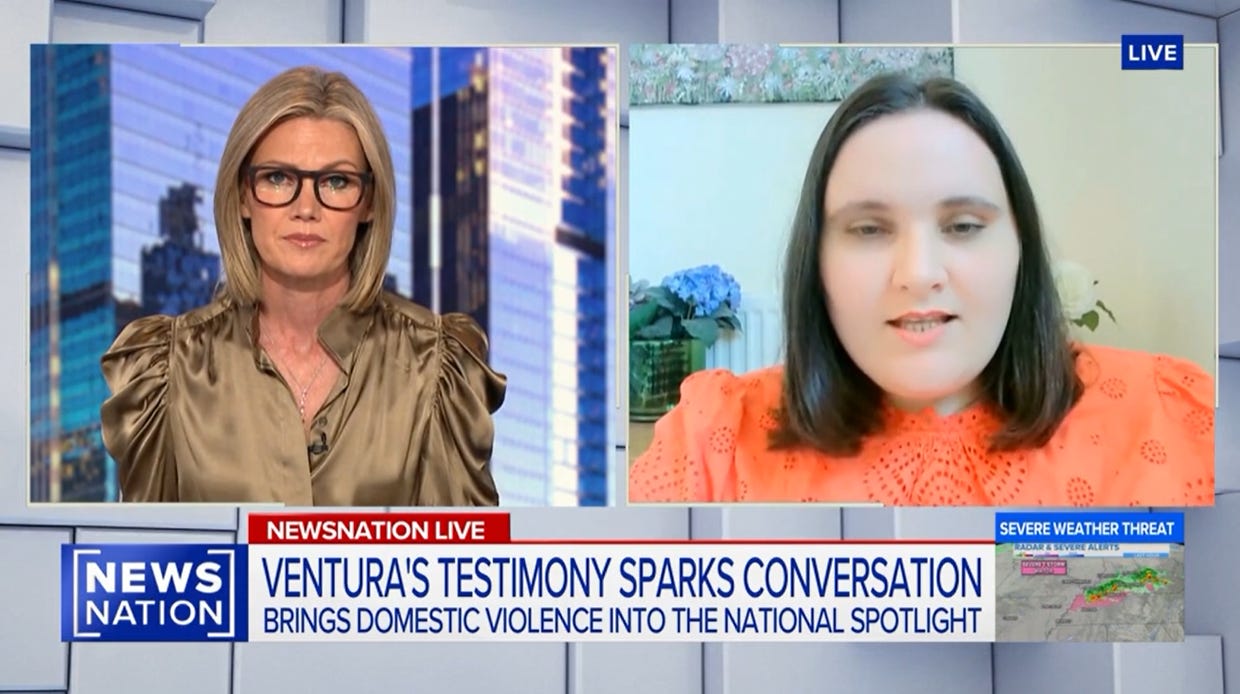Here's Why A Victim-Survivor Would Send Loving Texts To Their Abuser
I went on NewsNation Live to help make sense of Cassie Ventura’s brave witness testimony at the trial of Sean "Diddy" Combs
Dr Emma Katz is widely regarded as one the world’s foremost academic experts in her area of research — how coercive control impacts on children and young people.
Emma specializes in the harms caused by father-perpetrated coercive control, as well as children’s and mothers’ resistance and recovery. Read more in her book Coercive Control in Mothers’ and Children’s Lives, published by Oxford University Press.
Why send loving texts to someone who is abusing you?
That’s one of the questions I tackled on Friday 16th May when I went on American TV to discuss Cassie Ventura’s brave witness testimony at the trial of Sean “Diddy” Combs.
Watch it here.
The high-profile federal trial had begun in New York, with the 55-year-old Diddy pleading not guilty to charges of sex trafficking, racketeering conspiracy, and transportation to engage in prostitution.
Diddy held Cassandra "Cassie" Ventura in a relationship with him for over decade, and there is highly disturbing video footage of him beating and dragging her in a hallway of the InterContinental Hotel in Los Angeles in 2016. They first met when Cassie was 19 and Diddy was 37.
On day 5 of Diddy’s trial, NewsNation Live anchor Marni Hughes asked me a question relating to Cassie’s affectionate sounding texts to Diddy, and I made sense of them in light of Cassie’s testimony about Diddy’s abusive behavior towards her.
Credit to NewsNation
I explained that, in my expert opinion (which you already have the benefit of here on Substack), perpetrators expect compliance from those they are abusing. Perpetrators make it very clear that the victim-survivor must keep them happy or face their punishments.
But, more than that, perpetrators often expect and demand that the victim-survivor keep up a performance of being happily in love with them. As part of this performance, victims-survivors may be required by perpetrators to:
Send affectionate texts expressing love for them; and
Appear to be looking forward to or enjoying sexual acts that the perpetrator wants them to perform — acts they actually don’t want to be taking part in at all.
If a victim-survivor doesn’t seem sufficiently enthusiastic or loving, the perpetrator may punish them physically, psychologically, sexually or economically.
When a victim-survivor is fearful of being punished by a powerful perpetrator, and escape feels impossible, then it doesn’t make sense to talk about a victim-survivor “consenting” or “choosing” to do whatever the perpetrator wants.
In order to give a valid “yes”, we have to be in a situation where it is safe to say “no”. In order to be able to “choose” to stay in a relationship with someone, we have to be in a situation where we can also choose to leave them without facing coercion to come back or being punished for leaving.
Cassie spoke about how Diddy would violently beat her to make her fearful and obedient. She alleged that when she tried to leave, Diddy would threaten to blow up vehicles and send his staff to pressure her to return, among other tactics. Under such coercive conditions, Cassie couldn’t consent or make free choices.
Think about it. Imagine if you were in a car showroom and the car salesman started threatening you that you had to buy the car you were looking at or he’d hunt you down and hurt you.
One minute he seems normal, the next minute terrifying.
What he says convinces you that he’s a legitimate threat, capable of extreme retaliation if you walk away or try to report him.
You could try to go to his boss, but he tells you his boss won’t take any action to protect you, and then he’ll track you down and hurt you.
To get out of the situation safely, you do what the salesman wants and sign the agreement for the car.
But having been threatened and menaced, would you really expect to be held in a legal contract for that car? Of course, it would be legitimate to argue that you were acting under coercion and that your signature on the contract was therefore invalid.
Credit to NewsNation
What I could have also added for viewers, but didn’t get time to, is that abuse victims who are trapped with perpetrators develop complex feelings towards their abuser. The perpetrator becomes their whole world, because they isolate them from everyone else.
So, the victim-survivor may sometimes crave the perpetrator’s attention or affection, because without it they are unbearably alone. The perpetrator isn’t aggressive all the time and may appear “nice” and “generous” quite a lot of the time. Victims-survivors may cling to these “nice times” and hope for more of them, because they are one of the only sources of happiness that the victim-survivor has access to. There should be zero blame or shame attached to victims-survivors for this. It’s a normal response to an extreme situation.
Consequently, when Cassie spoke about wanting to spend time with Diddy or feeling affection for him, this is totally compatible with her account of being severely abused by him, and with her not being able to give valid consent to the sexual acts he wanted.
In my opinion, Cassie is an absolute hero for ultimately breaking free from Diddy. She is currently expecting her third child with her husband Alex Fine. I wish her a safe delivery and much happiness with her new baby and family.
Goodbye for now
Thank you for your continued support for Decoding Coercive Control with Dr Emma Katz. I look forward to writing my next post on this site very soon.







Thank you for going on NewsNation and speaking the realities of trying to survive a "relationship" with an abuser. Yes, please continue to use public cases to help keep the focus on and explain the complex, multi-faceted issues of trying to survive and escape an abusive partner. Grateful for all the work you're doing to save lives. Please let us know what WE can do for you to help spread the knowledge, support your work and help with prevention and intervention of this horrendous abuse of women and children.
I think this is incredibly important analysis. It is hard to comprehend the completly distorted ‘thoughts’ & behaviours abusers can implant in the victims mind. This is still not nearly well enough understood by the police or lawyers & judges, often causing further distress & punishment to the victim. It has recently been recognised that it can result in suicide and certainly Cptsd, ie lasting trauma